Key takeaways:
- Pro-life advocacy encompasses supporting women, families, and children, not just opposing abortion.
- Finding the right mentor is essential; shared values and mutual growth are key to a successful mentorship.
- Building meaningful relationships in the advocacy community fosters support and collaboration.
- Sharing personal stories and being transparent about challenges strengthens advocacy efforts and creates trust.
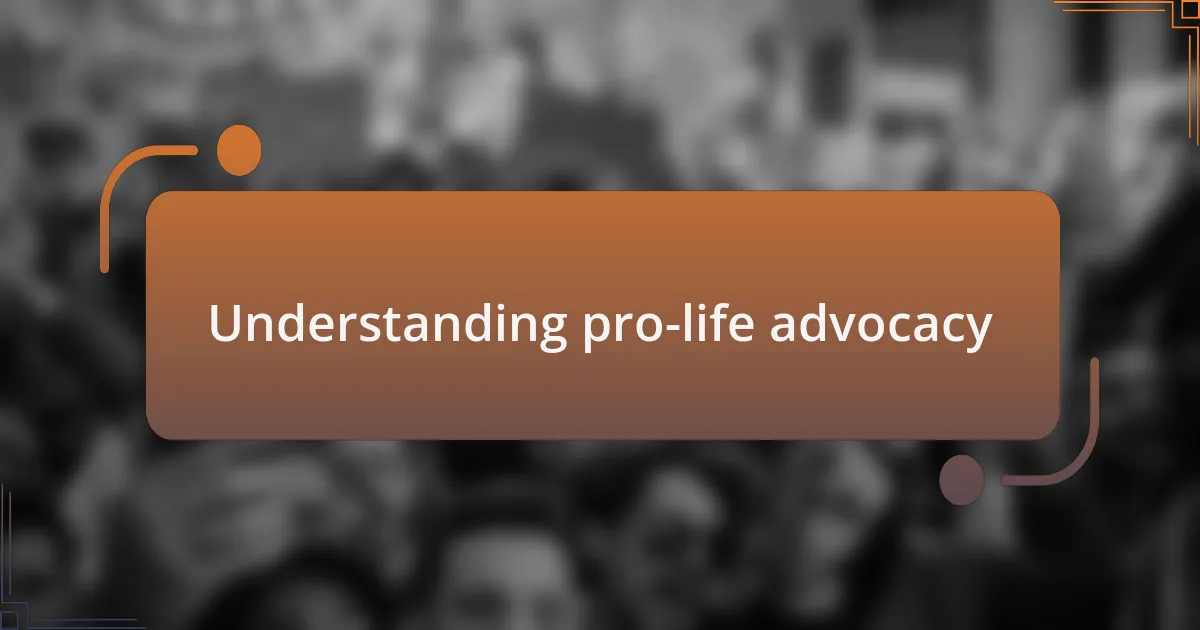
Understanding pro-life advocacy
Pro-life advocacy centers around the belief in the sanctity of life from conception to natural death. Growing up, I often found myself feeling conflicted when friends discussed their views on abortion. A simple question kept ringing in my mind: What does it truly mean to value life?
As I delved deeper into this topic, I came to realize that pro-life advocacy isn’t just about opposing abortion; it encompasses a broader commitment to support women, families, and children in need. I remember attending a local advocacy meeting where a young mother shared her story. Her journey opened my eyes to the challenges faced by those in unexpected pregnancies and the critical support that the pro-life community offers.
The emotional aspects of this advocacy become especially poignant when we think about the impact of our choices. Have you ever reflected on how personal experiences shape our views? In my case, volunteering at pregnancy centers revealed the struggles many women face and the compassion that can guide a pro-life stance. Each story reminds us that advocating for life is ultimately about fostering a culture where every individual feels valued and supported.
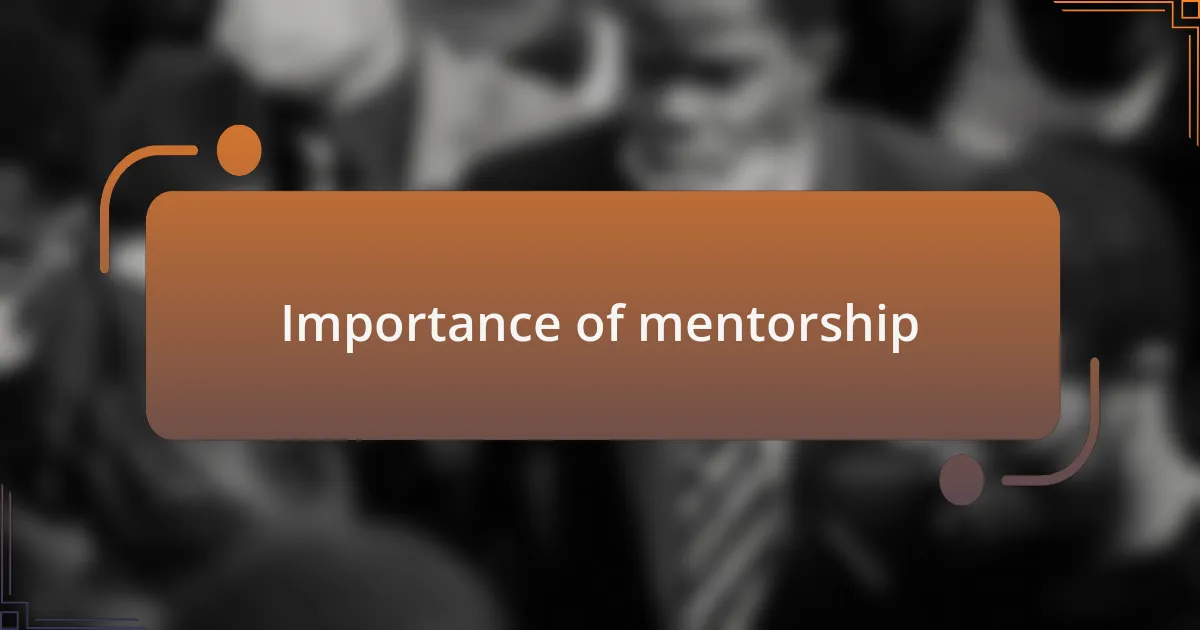
Importance of mentorship
Mentorship plays a crucial role in pro-life advocacy by providing guidance and support to those navigating the complexities of this movement. I remember my first mentor, a seasoned activist who not only shared strategies but also inspired me with her unwavering passion. Her ability to connect the personal with the political helped me understand that every voice counts in this advocacy.
Having a mentor can transform the way we approach difficult conversations about life issues. When I faced pushback from friends who held opposing views, it was my mentor’s advice that equipped me with the confidence to share my perspective calmly and effectively. This guidance was invaluable; it allowed me to engage in meaningful dialogue rather than simply arguing.
Moreover, mentorship fosters a sense of community within the pro-life movement. I’ve seen firsthand how mentors create networks that empower newcomers to become advocates themselves. Reflecting on my own journey, I often think: how would I have grown without the wisdom and encouragement of those who came before me? It’s evident to me that their impact has not only shaped my understanding but has also magnified my commitment to advocating for life.
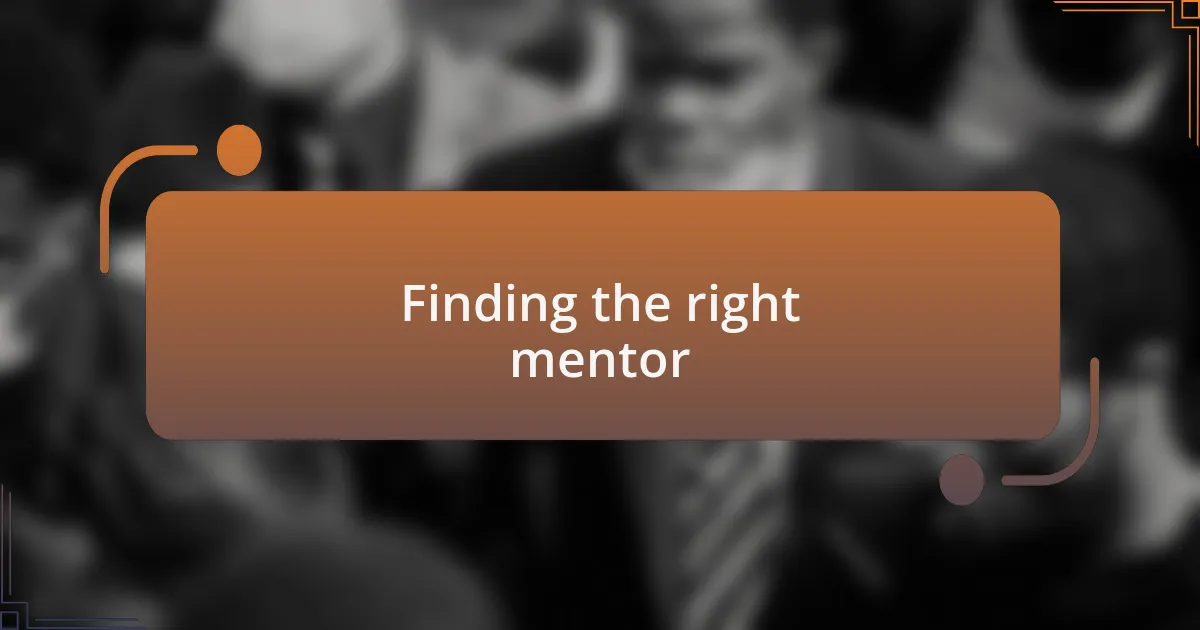
Finding the right mentor
Finding the right mentor is often about aligning values and goals. When I was searching for someone to guide me, I realized that shared beliefs were fundamental. I remember meeting a mentor at a local pro-life event, and it felt like a light bulb went off; we not only discussed strategies but also the deeper meanings behind our advocacy. Isn’t it amazing how a single conversation can clarify your path?
As I delved deeper into this journey, I learned the importance of varied perspectives. My mentor had a background in law, which illuminated the legal aspects of pro-life advocacy that I had overlooked. I found myself asking, “What can I learn from someone with a different skill set?” It turned out, a lot—her insights enriched my understanding and pushed me to think critically about our movement’s multifaceted nature.
Trust your instincts when evaluating potential mentors. There was one individual I was interested in, but after some discussions, I felt a lack of connection and understanding. The right mentor should challenge you, but they should also resonate with your values and be someone you can truly learn from. Remember, it’s about finding a partnership that inspires growth; that’s how you’ll know you’ve found the right mentor.
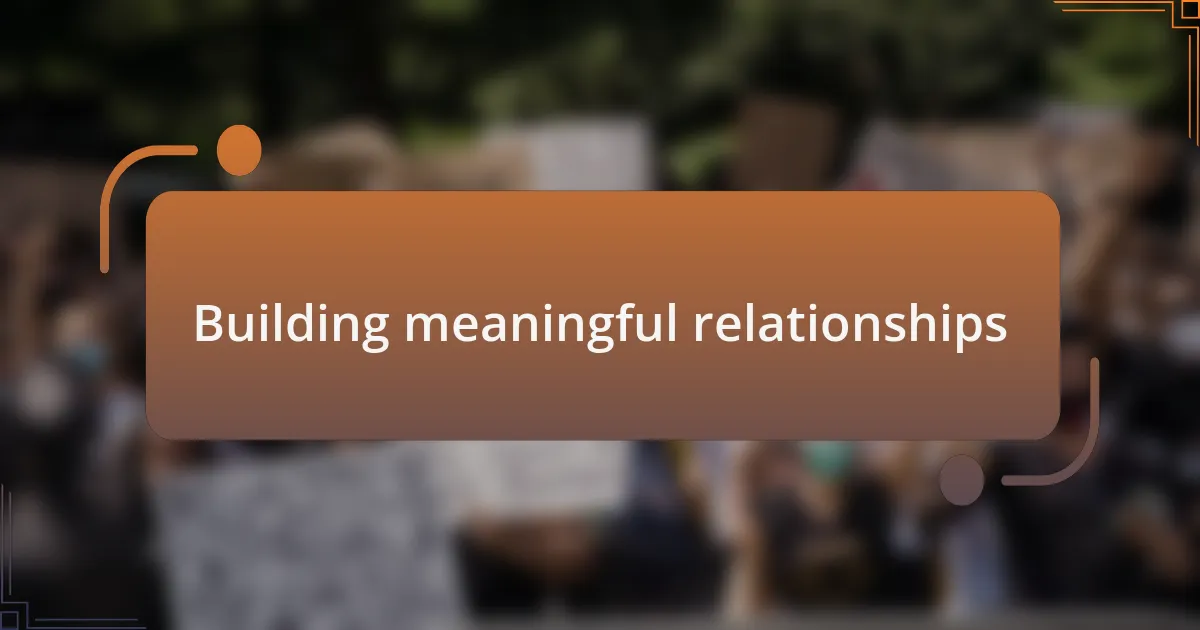
Building meaningful relationships
Building meaningful relationships goes beyond just professional gains; it’s about creating a genuine connection rooted in shared values. I recalled a time when a fellow advocate and I chatted over coffee, discussing our visions for the future of pro-life work. That exchange didn’t just strengthen our commitment to the cause; it ignited a lasting friendship that has proven invaluable in our advocacy efforts. Have you ever felt that instant bond with someone? It’s incredible how much can arise from simple yet profound conversations.
Investing in relationships means being vulnerable, too. I remember opening up to a mentor about my struggles and fears. Instead of offering superficial advice, she shared her own challenges, creating a safe space for me to express myself. This authenticity fostered a trust that transformed our interaction into a powerful mentorship. I often think—what if I hadn’t taken that leap of vulnerability? Would that connection have flourished as it did?
Finally, I believe that being proactive in nurturing these relationships is essential. Sending a quick message to check in, sharing resources that could help a peer, or simply expressing gratitude can go a long way. I started a monthly coffee catch-up with several advocates I met through mentorship. These catch-ups turned into brainstorming sessions and even collaborative projects. Isn’t it fascinating how relationships can evolve when you consciously invest time and effort into them?
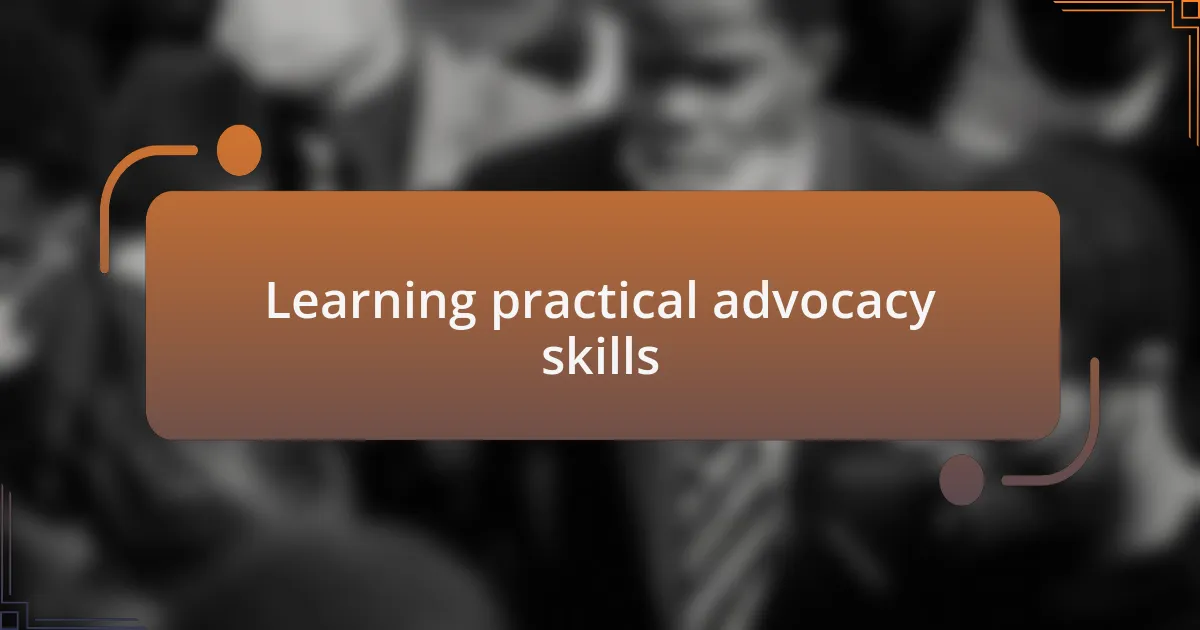
Learning practical advocacy skills
Learning practical advocacy skills is an essential part of my journey. I remember attending a workshop on effective communication strategies, where we role-played difficult conversations. This hands-on approach helped me understand the nuances of being persuasive while remaining respectful. Have you ever practiced your advocacy in a safe space? It’s astonishing how much confidence you gain when you try out different scenarios with supportive peers.
Through mentorship, I learned not just the ‘what’ of advocacy but also the ‘how.’ I vividly recall a mentor walking me through the process of organizing a community event to educate people about pro-life issues. She encouraged me to create a detailed plan, from securing a venue to drafting promotional materials. This experience taught me the importance of preparation and logistics, yet I often wonder—what would I have done without her guidance in navigating those early steps?
As I immersed myself in various activities, I found that reflection was key to my growth. After each event, my mentor and I would discuss what went well and what could be improved. This feedback loop became invaluable. Reflecting on those discussions, I realize that fostering a mindset of continuous improvement keeps my advocacy efforts fresh and impactful. How often do we take the time to reflect on our experiences?
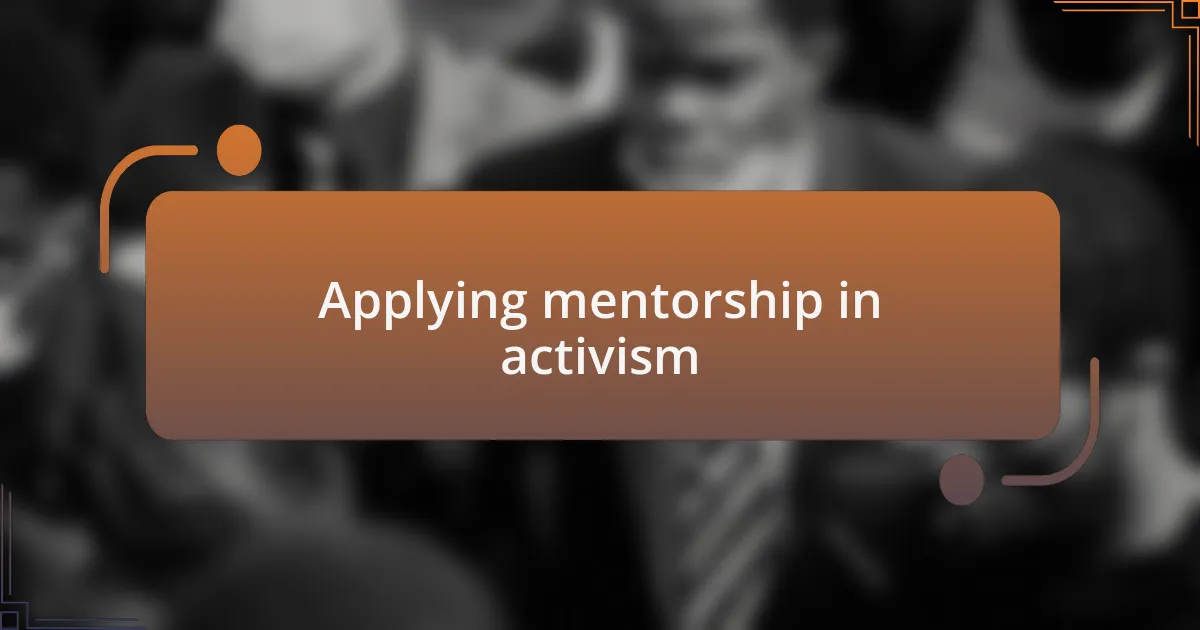
Applying mentorship in activism
In my journey, mentorship has played a pivotal role in applying activism strategies effectively. I recall a moment when my mentor and I stood outside a Planned Parenthood clinic, preparing for a peaceful demonstration. With her guidance, I learned to approach protesters not with hostility but with compassion. This shift in perspective not only diffused tension but also opened up authentic dialogues, making me realize—how often do we forget the humanity in our activism?
One of the most profound lessons I learned was the art of storytelling in activism. My mentor emphasized that personal stories resonate deeply with people. During one campaign, she encouraged me to share my own journey in a heartfelt letter that became part of our outreach. The warmth of sharing my experiences connected us with the community in ways I had never imagined. Isn’t it fascinating how our vulnerabilities can become powerful tools for change?
Additionally, mentorship has taught me the importance of adaptability in activism. I remember organizing a workshop that didn’t draw the expected crowd. Instead of feeling defeated, my mentor suggested that we gather feedback and pivot our approach. This experience instilled in me the value of resilience and flexibility, reminding me that every setback is simply an opportunity to recalibrate. How often do we allow ourselves the grace to adapt and learn, rather than simply push forward?
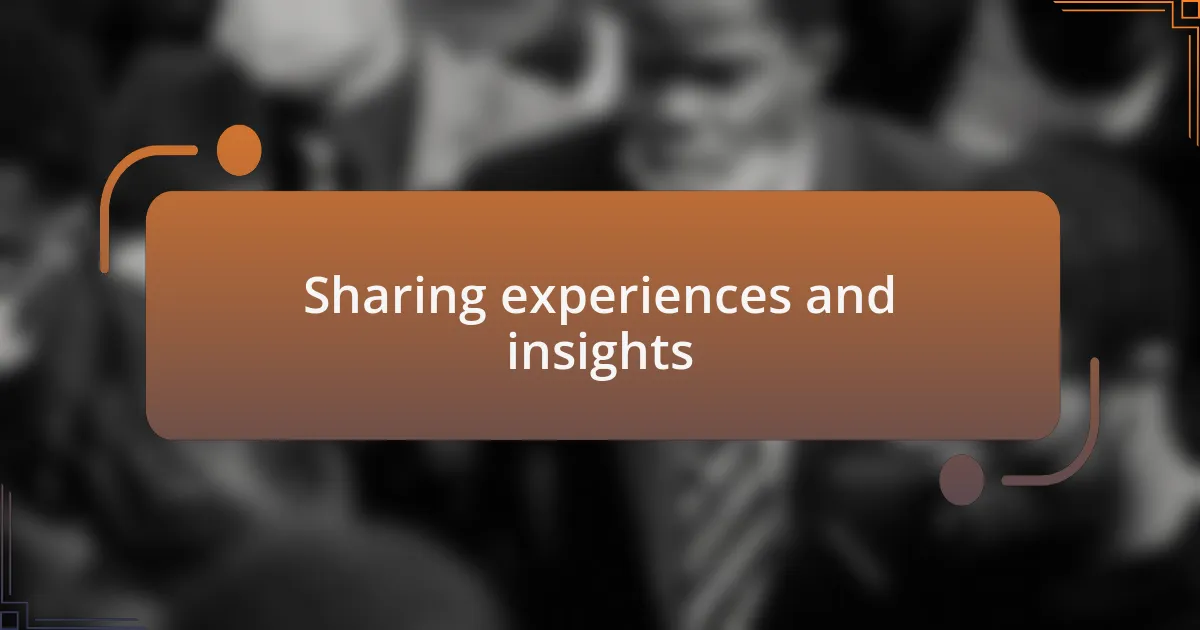
Sharing experiences and insights
Sharing experiences and insights is a cornerstone of effective mentorship. I vividly remember a moment during a community meeting when I nervously shared my first experience with pro-life advocacy. Afterward, several attendees approached me, sharing their own stories of struggle and hope. I realized then that opening up was not just about me; it created a space for others to connect and engage.
Reflecting on my mentor’s guidance, I learned that insights can come from both victories and challenges. One instance that stands out was when we faced backlash after a public event. My mentor reminded me that sharing our missteps was just as crucial as celebrating our successes. It helped me understand that transparency breeds trust—how often do we think about our challenges as stepping stones, not roadblocks?
Through these interactions, I found that vulnerability in sharing experiences can strengthen our advocacy efforts. I remember catching up with a mentee who was struggling to articulate her passion for life-affirming choices. Encouraging her to share her own journey not only boosted her confidence but also highlighted the varied narratives within our movement. Isn’t it amazing how revealing our truths can empower both ourselves and those around us?